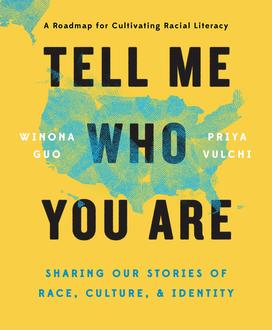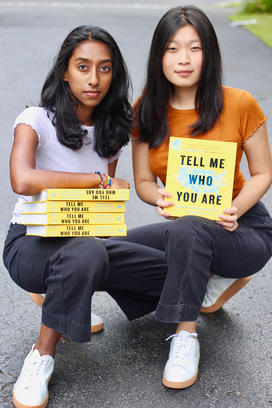Priya Vulchi ’22 Compiles Nationwide Anecdotes on Race

Selected from more than 500 interviews across all 50 states, these stories pinpoint the complexity of America’s racial identity, sharing the beliefs, struggles, and voices of a diverse microcosm of America. One by one, the contributors give us a glimpse into their American experience.

Instead of starting college in the fall of 2017, Winona and Priya convinced their parents to let them take a year off from school. After some fundraising — primarily through sponsorships from companies like Airbnb — they traveled alone to all 50 states and spoke with more than 500 strangers talk about race and intersectionality. Along the way, they also became the youngest TED speakers ever, giving another TED talk in addition to speaking at TEDWomen in 2017 (their talk, “What It Takes to Be Racially Literate,” has exceeded 1 million views), the United Nations’ Girl Up Conference, and more than a dozen K-12 schools nationwide. Winona and Priya are students at Harvard University and Princeton University, respectively.
Opening lines: As Yaari spun onstage, singing in an almost-forgotten language, the room vibrated with her rage and pain. Traditional blue Inuit tattoos protruding from her mouth like fangs, her black eyes stung the scattered audience, and her limbs wailed Hear me, hear my people as she danced to an Alutiiq drum. We sat, stunned, as she narrated Saint Lawrence Island Yup’ik stories.
We were at the very start of our journey: A day ago, we had landed in our first state, Alaska. We realized that we had never met anyone who identified as a full-blooded indigenous person before. In school, all mention of Native Americans stopped after the Trail of Tears. Priya remembers a kid shouting once, “No way! You’re Indian?! I thought they were extinct!!” Even when we had followed the typical tourist itinerary through downtown Anchorage, we saw White people everywhere.
Yet, suddenly, here we were watching Yaari dance, and her emotion pierced us. After she got off the stage, we hurriedly approached and asked her for an interview. She opened her mouth, stretching the five double stripes of her inky blue tattoos … and popped in a stick of bubble gum. “Follow me,” she said. We followed her to a large room at the back of the Alaska Native Heritage Center. There, a handful of Alaskan Natives sat behind information and artifact booths. They looked bored. An older man stared at his glowing phone while a red-haired woman absentmindedly ran her fingers alongside the ridges of her wooden sculptures.
“They’ll answer your questions,” Yaari calmly told us. “I’m sorry, but I don't feel comfortable talking about anything political on behalf of the Heritage Center. Plus, there’s a big tour group coming in about thirty minutes.”
She left. In front of us, the man put his phone down and the woman stood up. They told us their names: Alfred and Darlene. The glass window behind them framed a view of luscious trees standing tall behind a pond that reflected their spiky silhouettes and the icy blue sky. As Winona pulled out her phone to snap a photo, a bird swooped by, its feet grazing the water.
A tourist walked up to Darlene’s booth. “Beautiful sculptures,” we overheard him saying. “What a great display of Eskimo culture.” Darlene made a familiar face — the one we make before answering the Where are you from? question for the hundredth time — but we didn’t understand what was wrong.
Leaning over to look at the panoramic photo Winona took, Priya muttered, “Wow, this place feels so out-of-worldly. I mean, it’s crazy that it’s part of America!”
Alfred chuckled, and then said, “This place is more American than any other part of America. We are more American than any other American. We were here first.”
Those words were our foundation to understanding how race and racism inescapably impact everything around us. Even the very existence of the United States demanded their presence.
Reviews: “This is a critical book for current times where we are seeing a resurgence of nationalism, racism, sexism, and authoritarianism globally. Better communication and understanding, particularly among the next generation, is the key to humanizing the unfamiliar and countering identity politics. Kudos Priya and Winona for your vision, your journey and the honesty and respect with which you tackle diverse stories from across the country.”
—Yasmeen Hassan, Global Executive Director of Equality Now











No responses yet